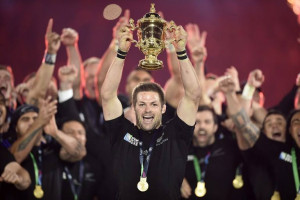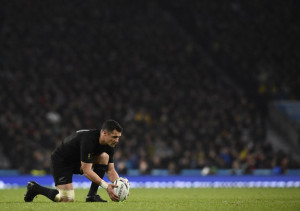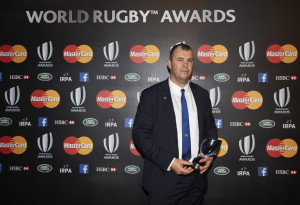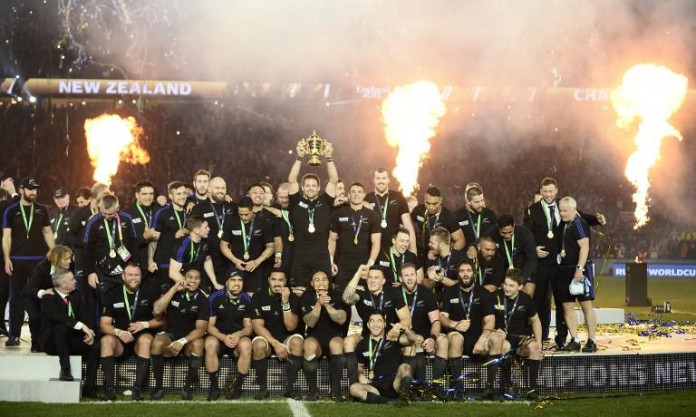They say all good things must come to an end. And like a little boy savouring each tiny bite from his favourite candy bar, the 2015 RWC has unfortunately come to an end, but not without many a memorable moment to savour. As I said last week, this has undoubtedly been the best RWC to date.
In terms of the teams that did not make the play-offs, the second tier nations can really hold their heads high. Georgia, with their inspirational leader Gorgodze thrilled audiences with their unquestionable commitment that saw them see off Tonga to the third spot, and with it automatic qualification for Japan 2019. Another minnow to win the hearts of the neutral were Romania. The Oaks pulled off one of the greatest comebacks to upset the more experienced Canadians 17-15. However, the most popular side had to be the Brave Blossoms. To think that a side could win three out of four games and still be knocked out seems grossly harsh. 
The biggest disappointments of this tournament were host nation England, and the Samoans from whom much was expected. Firstly, the English. Where did it go wrong? Where do I start? The selection was mind boggling. I have no issues with selecting Sam Burgess. But why select him at Centre, and at the expense of a regular international like Luther Burrell? That was just nonsensical. Going into a tournament of this magnitude, you have to have your first side, or at the very least, the important combinations penciled in. Seemingly, the England management had no idea. Another factor that proved costly was selecting players who were either not fully fit or woefully out of form. Ben Morgan hadn’t played too much rugby following his leg injury earlier in the season, and it showed. I would rather have gone with Nick Easter. Despite his advanced years he was playing the best he’s ever had, and I know what I would have got. In the front row, Joe Marler just hasn’t been the same players this year, for club or country. Are there no better front row forwards in England, a country and a domestic league that strongly revolves around tight play and grinding oppositions out?
As for Samoa, they just arrived at the party far too late. Having a side consisting of players in the caliber of Tim Nanai-Williams, and the Pisi brothers, with bags of experience, they had the ammunition to cause the bigger sides problems and push for a qualifying spot. However, they made far too many mistakes and were woefully undisciplined when defending. In fact they looked under-cooked and only really got it together against Scotland, when both teams put on a show for all on hand. They still came out on the wrong end of the result. Stephen

Betham has since departed, and it would be interesting to see how the Pacific Islanders go from here. World Rugby needs a hard tackling, daring Samoa side. So hope they get their house in order.
In the end, it came to the four best teams in the world, and how and where they finished was a good reflection on where they lie currently.
Argentina really lit up this tournament with their brand of ‘open’ rugby that Daniel Hourcarde has instilled upon his charges. As a rugby fan, long may that continue is what I hope for from the Pumas. But they perhaps could have seasoned that ‘openness’ with the sense of occasion and based on who their opponents were. That looseness is what I believe cost them dearly against Australia in the semifinals. They just fell too far behind in that first quarter and from then on, it was always a tall order. However, they finished a credible fourth, with players such as Santiago Cordero, Juan Imhoff, and Nicolas Sanchez engraving their names into rugby stardom.
The South African story is a peculiar one. The knives were out following that calamitous defeat to Japan in their first game. However, that seemed to invigorate that side, and despite losing Jean De Villiers, the Springboks just got stronger with every game. They along with Australia were the only sides capable of beating the All Blacks, and in that semifinal, they fell short of a hairs breath going down 18-20. At half-time, they led by five points and with the advantage of Jerome Kaino being in the bin. That was their moment. Maybe I’m undermining the All Blacks brilliance here a bit, but those Boks on the field that evening will feel that they let a golden opportunity slip away. Though we have now seen the last of a vintage of players in Bryan Habana, Schalk Burgher, Victor Matfield, and even perhaps the Du Plessis brothers, the good news is that they have a fine bunch of youngsters that look at home on the International stage. Lood De Jager, Etzebeth, Jesse Kriel, and De Allende have taken their opportunities with both hands, not to mention Hendre Pollard, widely regarded to be one of the best fly half’s around. The jury is still out on Heyneke Meyer. Some feel that he needs to be given another shot, given they finished strongly and the fact that he has the backing of the youngsters. However some quarters find his confrontational, physical approach insipid and devoid of creativity. Would be interesting to see which way the SARU goes.
The progress Michael Cheika has made in such a short time has been nothing short of exceptional. Thus, he deserved every bit of the ‘Coach of the Year’ award bestowed on him recently. This Wallaby side were a treat to watch. Michael Hooper and David Pocock were a master class for any young up and coming third row forward watching the game. Matt Gitueau with his experience was the talisman in midfield, and Adam Ashley-Cooper was as consistent as he always is. To comeback from 21-3 down to within a score of the All Blacks till the last minute took something special, and is a testament to the quality of this Wallaby side. Losing an epic final is never easy to take. But as they shake away that disappointment and take stock, they will see the potential of all the hard work done. The All Blacks will be in re-build mode come next season. Cheika has built a strong cohesive unit. We could just be going into a new era where this Wallaby team will have a huge say.

All that can be said about the All Blacks has been said. All that can be written has been written. Have we just seen the greatest All Blacks outfit ever to grace a field? I believe so. As I do that Richie McCaw is the greatest amongst them, with Dan Carter a not-so-distant second. When you have a bloke like Sonny Bill Williams coming on as an impact replacement that says something about the side. Going into the knock-out phase, I believed that New Zealand were always going to win this trophy. They just seemed to have a gear to go up to that none of the others possessed. It was not just the rugby and raw talent that made them a champion side. It was the team ethos, aspects like remaining humble, respecting the opposition, and situational leadership that has caught the imagination of rugby fans and management gurus alike. The great Dan Carter, Keven Mealamu, Conrad Smith, Tony Woodcock, Ma’a Nonu, have all bid adieu. King Richie looks set to follow down the same vein. This exodus will leave a huge void to be filled by young shoulders. Steve Hanson, probably has his most compelling days as All Blacks coach in front of him – to bed in a new core of players into the system. His system. He will have to move swiftly, with the mouthwatering prospect of a ‘Lions’ tour not too far away on the horizon.






















